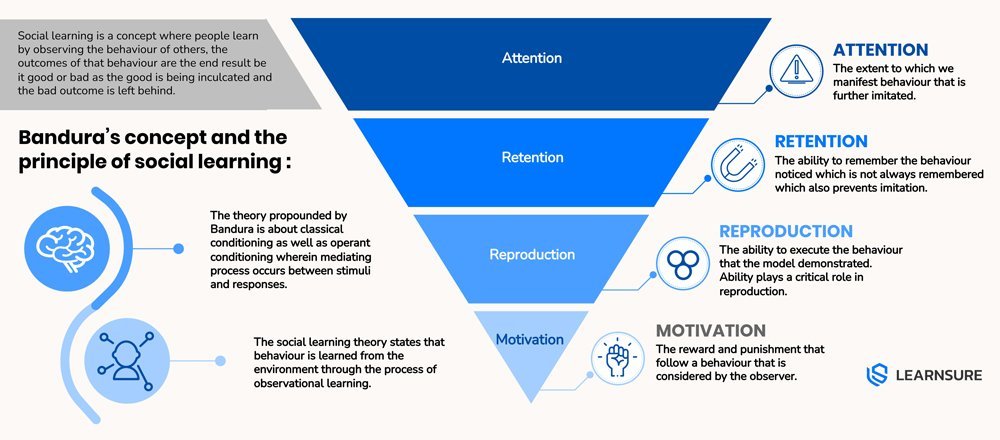A dig into the theory of social learning
The daily lives of humans are filled with innumerable experiences, the experience of good and bad; of success and failure; of happiness and sorrow. What one perceives of these experiences is subjective and forms diverse individual personalities. This is what the theory of social learning does, it draws an individual’s behaviour from their experiences. The environment and societal interactions tell a lot about an individual’s personality. Both of these factors have a vital role to decide, how a person would react to a situation?
It thus has a separate significance in the world of learning.
The conventional way of learning has a comparatively less retention rate than the modern developed ways. Social learning has a different impact and outcome in today’s scenario as with the developing and evolving nature humans tend to adapt things and traits which can be carried along easily because all their learning comes to test when they face actual problems in reality and when they are in a situation to decide upon. Social learning in today’s time is also about the ability to connect and stay together and have peace as the action is what the reaction is based upon. Observational learning is quite evident in these modern times where one has started to keenly observe and interpret things and situations they are surrounded with.

Bandura’s concept and the principle of social learning–
The theory propounded by Bandura is about classical conditioning as well as operant conditioning wherein mediating process occurs between stimuli and responses. The theory given by Bandura further states that behaviour is learned from the environment through the process of observational learning. The key elements of his theory are:
- Attention – The extent to which we manifest behaviour that is further imitated.
- Retention – The ability to remember the behaviour noticed which is not always remembered which also prevents imitation.
- Reproduction – The ability to execute the behaviour that the model demonstrated. Ability plays a critical role in reproduction.
- Motivation – The reward and punishment that follow a behaviour that is considered by the observer.
This theory emphasizes the importance of observing and modelling the behaviour, attitudes and emotional reactions of others in our surrounding.
The changing world and the rapid growth of development have also resulted in the demand for socialization which also has a very strong impact on an individual’s behaviour wherein they are prepared for a social lifestyle.
Socialization has also enhanced the human outlook where they get to involve themselves, learn things to which they were never familiar with before and this aspect which is highly involved in this social learning is the cultural aspect and outlook.
Social learning is a concept where people learn by observing the behaviour of others, the outcomes of that behaviour are the end result be it good or bad as the good is being inculcated and the bad outcome is left behind.
At Learnsure, our learning programs use the principles of social learning to engage learners at a deeper level. Our Certificate programs are designed to make social learning a tool to build confidence and improve the mental strength of the learner.



